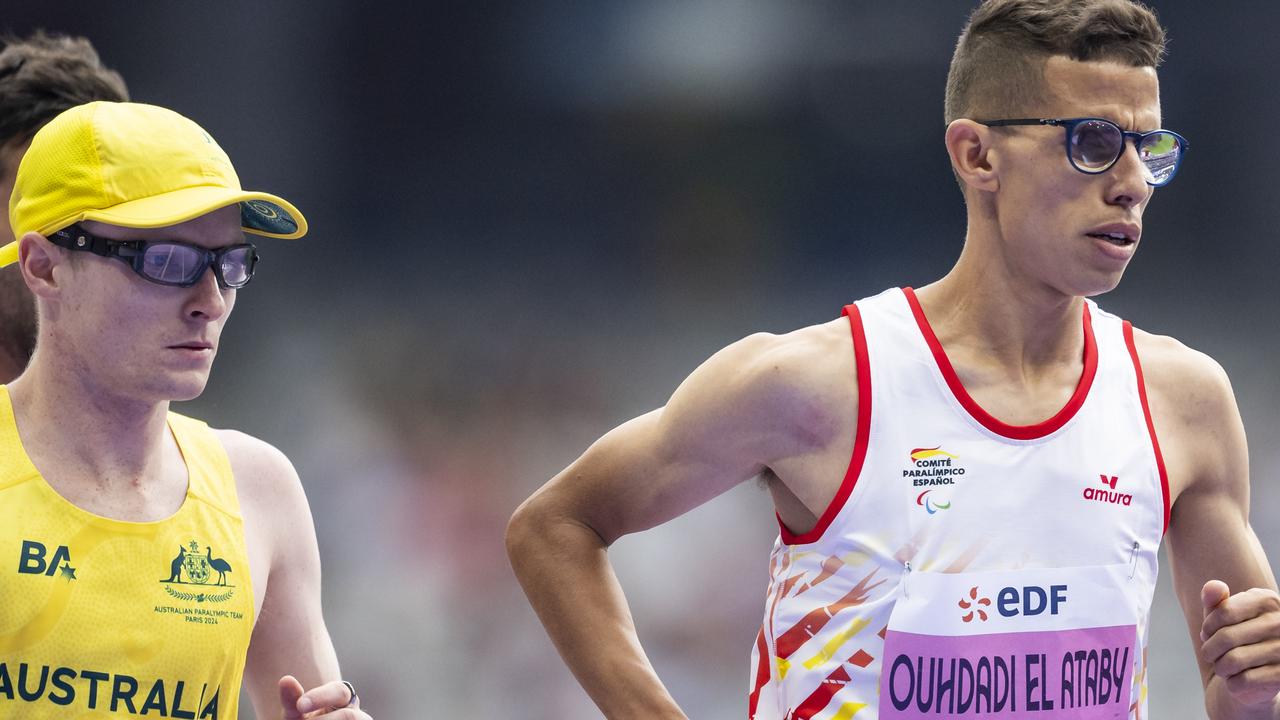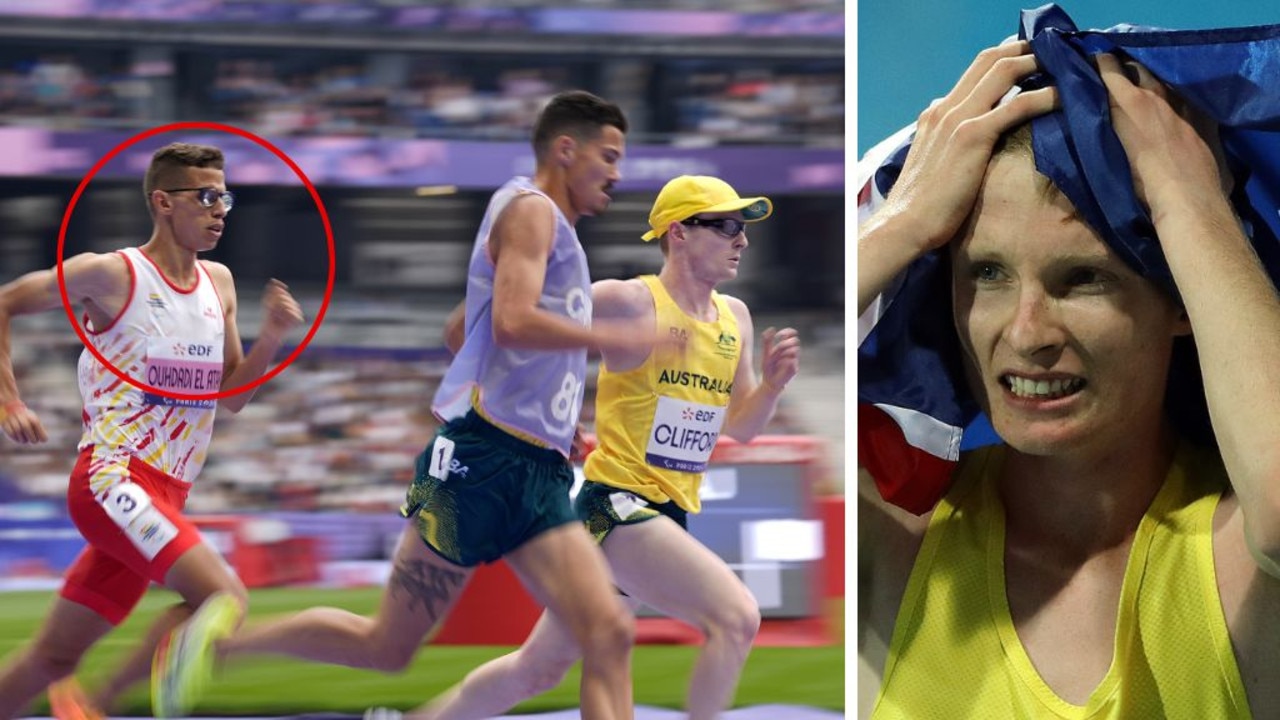Tokyo Paralympics 2021: day 12 rolling coverage; Madi di Rozario marathon gold
Australia’s 21st and final gold in Tokyo is sure to live long in the memory as Madi di Rozario somehow found the energy for one last push when she had nothing left to grab a famous victory.
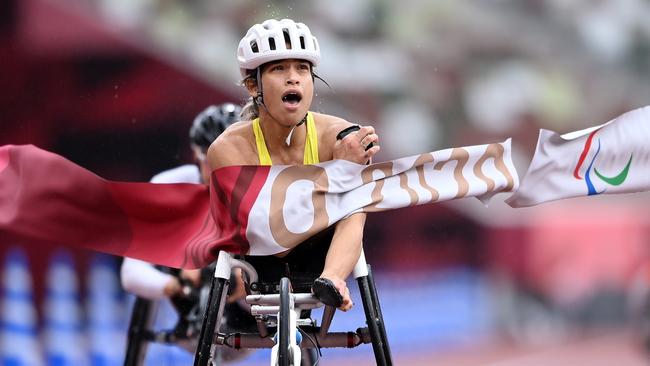
Paralympics
Don't miss out on the headlines from Paralympics. Followed categories will be added to My News.
Paralympic legend Kurt Fearnley has been involved in a few epic races himself so when he called Madi di Rozario’s sensational victory in Tokyo as the greatest marathon he’s seen in the green and gold then, you knew this really was something special.
Like Fearnley, Louise Sauvage has been in a few tough scraps too, winning nine Paralympic gold medals in her career, so when she described di Rozario’s win as a “heart-stopper”, that was the ultimate proof something extraordinary had taken place.
And they were right.
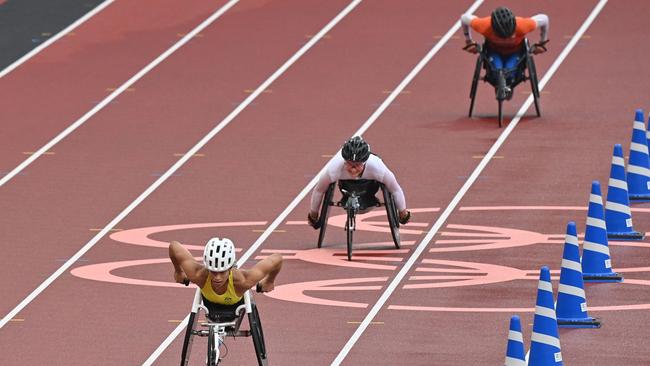
The marathon has always held a special place with the Australian public because it is the ultimate test of body and mind, but di Rozario’s win in the women’s wheelchair race was something right out of the box.
Trailing for almost the entire 42km trip, she gambled by making her move to take the lead on the gut-busting hill climb 2km from the finish, but it was a risky strategy.
She entered the Olympic stadium first but was spent and hadn’t counted on Switzerland’s Manuela Schaer challenging her on on the longest lap of her life around the synthetic track.
For everyone watching in Australia, it was a rare moment for celebration at such a bleak time in history, because the 27-year-old looked beaten but never gave up, somehow finding the energy for one last push when she had nothing left to clinch Australia’s 21st and final gold in Japan.
“That finish line definitely could not have come quick enough,” di Rozario said.
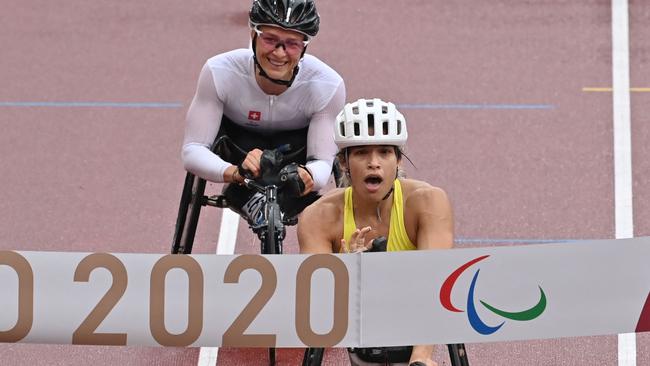

“There was a moment there when I was like ‘just make peace with silver because this hurts so that would be okay.’
“But I’m just so happy that I had enough in me to bring it home.”
The response to di Rozario’s win was instant and global as footage of her courageous finish began trending on social media.
But it was those who are closest to her that best summed up what she achieved.
“I just really hoped she could hang on,” said Sauvage, who now coaches di Rozario.
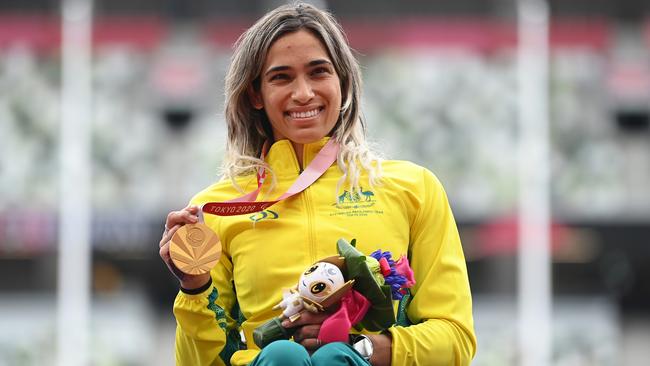
“She was just hanging on, it‘s horrible, I’ve done it myself, but to come home and sprint the last bit is just insane, isn’t it?”
Born with a neurological disease which inflamed her spinal cord, di Rozario has spent a lifetime becoming an overnight success.
The toymaker Barbie made a replica doll of her and Tokyo was her fourth Paralympics but the first when she won gold.
Like everyone else, she feared her best chances of winning the biggest prize in Paralympic sport had come and gone, but she refused to give in.
Not only did she win the marathon, but she also won the 800m and a silver in the 1500m, but said what pleases her most is the that she played a part in raising the profile of the entire Australian Paralympic team.
“I‘m a little bit overwhelmed to be honest,” she said. ”These Paralympic Games have had such an enormous impact back home in Australia.
“I think it‘s going to be huge. I think some Games are a catalyst. I think Sydney 2000 was one, London 2012 was one and I haven’t seen the full effects of Tokyo just yet but I’ve got a really good feeling this could be one as well.
HEROIC AUSSIES PUSH THROUGH PAIN BARRIER
The marathon has never been for the faint-hearted but the ultra endurance races at the Tokyo Paralympics were especially cruel to Australia’s two male runners.
Jaryd Clifford, who competed in the visually impaired category, vomited repeatedly for the last 12km of his race but still managed to finish and win the silver medal.
Michael Roeger, who ran in the amputee classification, was equally heroic.
The soul of the Australian athletics team, he was cramping so badly in the Japanese humidity that he collapsed immediately after he crossed the line in fifth place and was placed on an intravenous drip and given oxygen as he slipped in and out of consciousness.
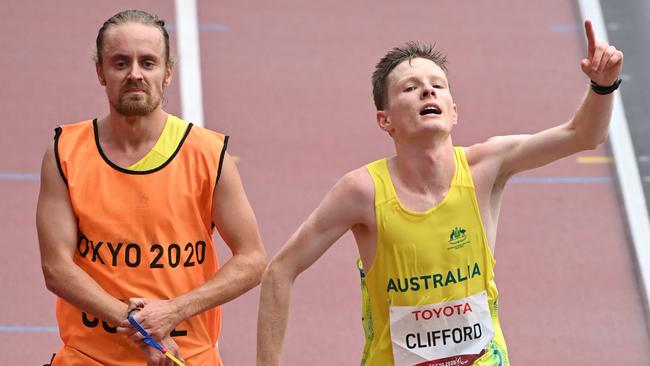
Fighting back tears, he said he was devastated that he hadn’t won, believing that he had let everyone down, even though he hadn’t at all.
In reality, he should not have been running in the first place after he was recently diagnosed with stress fractures in his shin, but pushed himself through the pain barrier because the Paralympics mean so much to him.
“I want a gold medal but at the end of the day, it‘s not going to define me,” he said.
“If I’m not good enough without the gold medal then I’m not going to be good enough with it so I’ve just got to keep enjoying the journey.
“I’m 33 and I’ve got a lot to learn in the marathon. so there’s a lot more in me over the next three years.
“I won‘t stop until I know I’ve exhausted everything I’ve got out of the marathon. It’s a beast of an event but I love it and my time will come.”
Clifford, running in just his second marathon, also needed to dig deep just to finish the race.
He had already won a silver medal in the 5000m and a bronze in the 1500m but wasn’t sure he could make it to the end, let alone collect another medal.
“I am bloody cooked,” he said.
“I threw my guts up 28-30km in. That’s a scary feeling. Running 12km when you’ve already done 30km feels a long way.
“I was throwing up that whole last lap. My body is so sore. That’s the hardest thing I’ve ever done.”
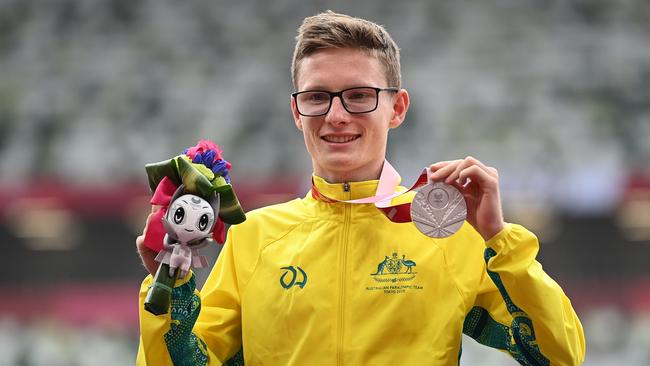
Tim Logan was one of two visual guides who ran alongside Clifford, helping him with his navigation. Because the race is so long, they split it in half, with Logan running the second part. An accomplished distance runner himself, he was in awe of what Clifford had done.
“He‘s just the toughest kid ever. Not everyone can do that,” Logan said.
“He’s walking away from here with three Paralympic medals. He talks it down a lot but he’s one special kid, he’s tough.”
Like Roeger, Clifford had his heart set on gold when he arrived in Tokyo but the events of the past two weeks have changed his perspective.
“I thought I’d leave these Games absolutely shattered if I didn’t win a gold medal but sport is so much more than that,” he said.
“I’ve spent the last 12 months away from most of my friends and family after moving to Canberra because Victoria was in lockdown, so it’s been very tough.
“The pressure has been immense. It‘s been relentless for almost five years. With a lap to go, I just wanted it to be over.
“And I love Roeges, my training partner, it didn’t quite go his way today and that breaks my heart because I know how much he wants this and I still believe in him so much.
“It’s three years to Paris, he can do it and we’re going to be there together. We’re going to nail it and that helped me keep going because you can’t take this shit for granted.”




